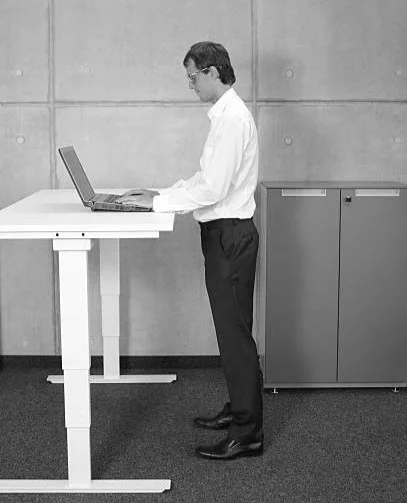Home
Work hard without LITERALLY breaking your back
By now, most of us know that sitting all day at a desk is killing us… slowly.
Fortunately, many workplaces across the world are incorporating workstations and policies that tailor our working tools to the needs of our bodies (known as ergonomics or human factors). It is a company's responsibility to care about employees' health and to provide regular support for staying safe at work.
But what happens when entrepreneurs and freelancers go into business for themselves, armed only with determination, a Macbook Pro, and the latest Seth Godin book? AND then what happens WHEN THE ENTIRE office-based workforce moves to work from home indefinitely, due to a global pandemic?
As we find the most comfortable spot to work from on the couch, set up home offices, coffee-shop-hop, or rent a co-working space, we don't always consciously consider the needs of our bodies.
Sure, we might KNOW we shouldn't be sitting for so many hours.
Just like we KNOW we should go running every day and we KNOW we should stop eating so many cheese fries...
But look how THAT worked out.
We ignore ergonomics because there are not enough good resources out there to offer tools, give us the full scoop on workplace physical and mental health, and consider our ever-growing needs as professionals who have a desk job but don’t have a traditional desk setup. Added to that, the new workforce trends create a need for a whole new set of habits and practices, which can be difficult to adopt.
When you are working from home, there is no longer a kind HR lady who comes by to measure your workspace and make sure your elbows and knees are always at 90-degree angles. Just like you are in charge of your own professional development and career mapping, you are now also in charge of your own workspace setup and habits, which directly affect your physical and mental health AND your future ability to work. And - for entrepreneurs and leaders - if your company grows, you’ll have to consider this for your staff, as well!
Poor ergonomic setup and work habits can seriously damage your body - which needs to be healthy and optimally-functioning in order to achieve those incredible goals you have set for yourself. But the worst case scenario? If you get too sick to work, you may be sacrificing your health and your future ability to continue your livelihood.
There is no question that ergonomics is important for everybody who works with technology. But this is especially relevant on a larger scale because, as the future of work develops, more of our workforce will shift from traditional office jobs into a nontraditional workforce - entrepreneurs, freelancers, remote workers, side hustlers, etc. The statistics on this are still developing, but one study in 2018 showed that 35% of the US workforce are freelancers and expected to reach 43% by the end of the decade. That’s 56.7 million people - and that is only one part of the nontraditional workforce. As of 2020, that number went up to 100% of desk job workers due to COVID-19 precautions. As of 2024, we’re seeing a more permanent shift as remote-first cultures become the norm.
If large percentages of our global workforce start to struggle with their health, we could have an economic and public health issue on our hands.
So you can sit around and wait for the aches, pains, and ongoing illnesses to come find you (like a… well, a sitting duck). Or you can take the same vigor that you put into your work and invest it into your health.
Sitting Duck™ takes a behavior science and human-centered design approach to understanding how we work from home and in alternative work environments. We consolidate crucial information and useful tools to help you develop good workday habits so you can keep doing your job without jeopardizing your health.
Additionally, while this platform began as a look into the physical health implications of desk jobs, it has much broader implications about what it means to care for your health at work (including physical and mental health). It will also examine what it looks like to have dignity, freedom, agency, and trauma-informed support while working – as the concept of safety at work has now extended beyond what we have traditionally known it to be. These are spaces I’ve been passionate about for a long time and I am thankful that we are reaching inflection points about them, with interest in these dialogues moving across different industries, professions, and locations.
So you can expect more about all of those topics. Plus, there will be friendly reminders to get up and stretch. Lots of those. Like, every hour. Because that's how often you are supposed to stretch.










I’d like to share with you my life hack of life hacks that has completely changed my experience of standing desks and given me a workday freedom that I never knew before. You’ll laugh. You’ll cry. You’ll buy new shoes.